Purdue Pharma, the company that made billions selling the prescription painkiller OxyContin, filed for bankruptcy in White Plains, New York, days after reaching a tentative settlement with many of the state and local governments suing it over the toll of opioids.
The filing was anticipated before and after the tentative deal, which could be worth up to $12 billion over time, was struck.
"This settlement framework avoids wasting hundreds of millions of dollars and years on protracted litigation," Steve Miller, chairman of Purdue's board of directors, said in a statement, "and instead will provide billions of dollars and critical resources to communities across the country trying to cope with the opioid crisis. We will continue to work with state attorneys general and other plaintiff representatives to finalize and implement this agreement as quickly as possible."
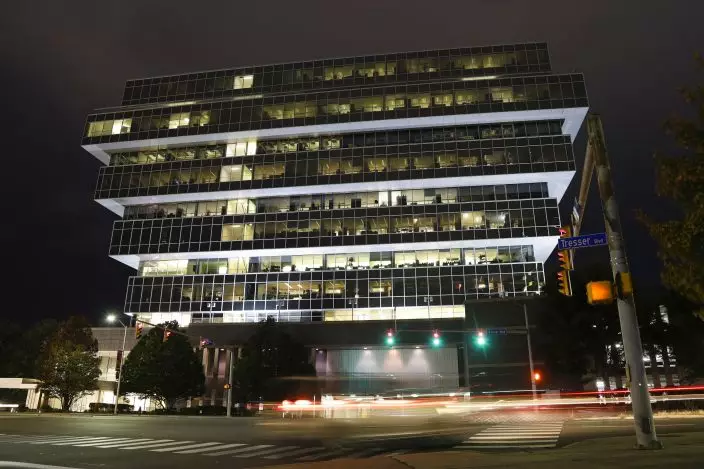
FILE - In this Sept. 12, 2019, file photo, cars pass Purdue Pharma headquarters in Stamford, Conn. The company, which makes OxyContin and other drugs, filed court papers in New York on Sunday, Sept. 15 seeking Chapter 11 bankruptcy protection. (AP PhotoFrank Franklin II, File)
But legal battles still lie ahead for Stamford, Connecticut-based Purdue, which is spending millions on legal costs as it defends itself in lawsuits from 2,600 government and other entities. About half the states have not signed onto the proposal. And several of them plan to object to the settlement in bankruptcy court and to continue litigation in other courts against members of the Sackler family, which owns the company. The family agreed to pay at least $3 billion in the settlement plus contribute the company itself, which is to be reformed with its future profits going to the company's creditors.
In a statement, the families of late company owners Mortimer and Raymond Sackler said they have "deep compassion for the victims of the opioid crisis" and believe the settlement framework "is an historic step toward providing critical resources that address a tragic public health situation."
Objections came over the amount of the deal, which some officials say will not reach close to the $12 billion mark, and because it means the company won't be found liable by a jury or judge.
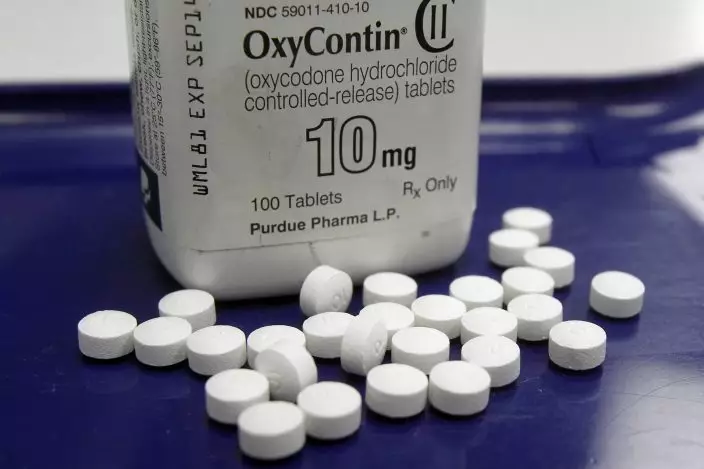
FILE - This Feb. 19, 2013, file photo shows OxyContin pills arranged for a photo at a pharmacy in Montpelier, Vt. Purdue Pharma, the company which makes OxyContin and other drugs, filed court papers in New York on Sunday, Sept. 15, 2019, seeking Chapter 11 bankruptcy protection. (AP PhotoToby Talbot, File)
Purdue chairman Miller said the company has not admitted wrongdoing and does not intend to. "The alternative is to not settle but instead to resume the litigation," he said on a conference call with reporters. "The resumption of litigation would rapidly diminish all the resources of the company and would be lose-lose-lose all the way around. Whatever people might wish for is not on the table now."
Because so many states balked at the settlement, it could complicate the bankruptcy process. The Sackler family members said they're still trying to get more states to sign on.
"We are hopeful that in time, those parties who are not yet supportive will ultimately shift their focus to the critical resources that the settlement provides to people and problems that need them," they said.

FILE - In this Sept. 12, 2019, file photo, cars pass Purdue Pharma headquarters in Stamford, Conn. The company, which makes OxyContin and other drugs, filed court papers in New York on Sunday, Sept. 15 seeking Chapter 11 bankruptcy protection. (AP PhotoFrank Franklin II, File)
Key issues that could be decided include whether the suits against the Sacklers in state courts will be able to move ahead, and what will happen to the company itself. Under the tentative settlement deal, it would continue to operate, but with profits used to pay for the settlement. Another option could be for a judge to order it be sold.
Court filings assert that members of the Sackler family were paid more than $4 billion by Purdue from 2007 to 2018. Much of the family's fortune is believed to be held outside the U.S., which could complicate lawsuits against the family over opioids.
A court filing by the New York Attorney General's office on Friday contended that Sackler family members used Swiss and other hidden accounts to transfer $1 billion to themselves. The discovery of the transfers bolsters several states' claims that family members worked to shield its wealth because of the growing legal threats against them and Purdue.
The Sacklers have given money to cultural institutions around the world, including the Smithsonian Institution, New York City's Metropolitan Museum of Art and London's Tate Modern.
SEOUL, South Korea (AP) — The United States and its allies are discussing options “both inside and outside the U.N. system” to create a new mechanism for monitoring North Korea over its nuclear weapons program, the American ambassador to the United Nations said Wednesday.
Russia last month vetoed a U.N. resolution in a move that effectively abolished monitoring by U.N. experts of Security Council sanctions against North Korea, which prompted Western accusations that Moscow was acting to shield its arms purchases from North Korea to fuel its war in Ukraine.
“I look forward to engaging with both the Republic of Korea and Japan, but like-minded (countries) as well, on trying to develop options both inside the U.N. as well as outside the U.N. The point here is that we cannot allow the work that the panel of experts were doing to lapse,” U.S. Ambassador Linda Thomas-Greenfield told a news conference in Seoul, using the formal name for South Korea.
Thomas-Greenfield didn’t provide specific details about U.S. discussions with allies and other partners, including whether an alternative monitoring regime would more likely be established through the U.N. General Assembly or with an independent entity outside of the U.N.
Thomas-Greenfield met with South Korean Foreign Minister Cho Tae-yul on Monday and they discussed unspecified “next steps to ensure a continuation of independent and accurate reporting” of North Korea’s illicit weapons development activities, according to her office.
Thomas-Greenfield said it was clear that Russia and China, which abstained from voting on the U.N. resolution vetoed by Moscow, will continue to try to block international efforts to maintain monitoring of U.N. sanctions against North Korea. She criticized Russia for violating those sanctions with its alleged arms purchases from North Korea, and China for protecting the North from being held accountable.
Moscow and Beijing have thwarted U.S.-led efforts to tighten U.N. sanctions on North Korea over its ramped-up ballistic missile testing since 2022, underscoring a divide between permanent Security Council members that deepened over Russia’s war on Ukraine.
“I don’t expect that they will cooperate or agree with any efforts that we make to find another path, but that is not going to stop us from finding that path moving forward,” Thomas-Greenfield said.
Thomas-Greenfield also briefly addressed questions about tensions in the Middle East. When asked about the Palestinian Authority's request to have full U.N. membership, she said a U.N resolution in support of that request would not contribute to finding a two-state solution to the Israeli-Palestinian conflict.
“President Biden has said categorically that we support a two-state solution for addressing the situation in the Middle East, where Palestinians will have a state of their own and Israel is secure in their state, and we are working on the ground to get to that place as quickly as possible,” she said.
“We do not see that doing a resolution in the Security Council will necessarily get us to a place where we can find a ... two-state solution moving forward," she added.
Tensions on the Korean Peninsula are at their highest point in years, as North Korean leader Kim Jong Un has accelerated his weapons demonstrations and issued provocative threats of nuclear conflict against rivals.
The United States, South Korea and Japan have responded by expanding their combined military exercises and sharpening their nuclear deterrence strategies built around strategic U.S. assets.
In a telephone conversation on Wednesday, South Korean President Yoon Suk Yeol and Japanese Prime Minister Fumio Kishida agreed to further strengthen three-way cooperation with Washington to counter North Korean threats and other regional challenges amid “deepening uncertainties in the international situation,” Yoon’s office said.
The Security Council imposed sanctions after North Korea’s first nuclear test explosion in 2006 and tightened them over the years in a total of 10 resolutions seeking — so far unsuccessfully — to cut funds and curb its nuclear and missile programs. The last sanctions resolution was adopted by the council in December 2017.
The Security Council established a committee to monitor sanctions, and the mandate for its panel of experts to investigate violations had been renewed for 14 years until last month.
Russia’s U.N. Ambassador Vassily Nebenzia told the Security Council before last month’s vote that Western nations are trying to “strangle” North Korea and that sanctions are losing their “relevance” in preventing the proliferation of nuclear weapons in the North.
In its most recent report circulated last month, the panel of experts said it is investigating 58 suspected North Korean cyberattacks between 2017 and 2023 valued at approximately $3 billion, with the money reportedly being used to help fund its weapons development.
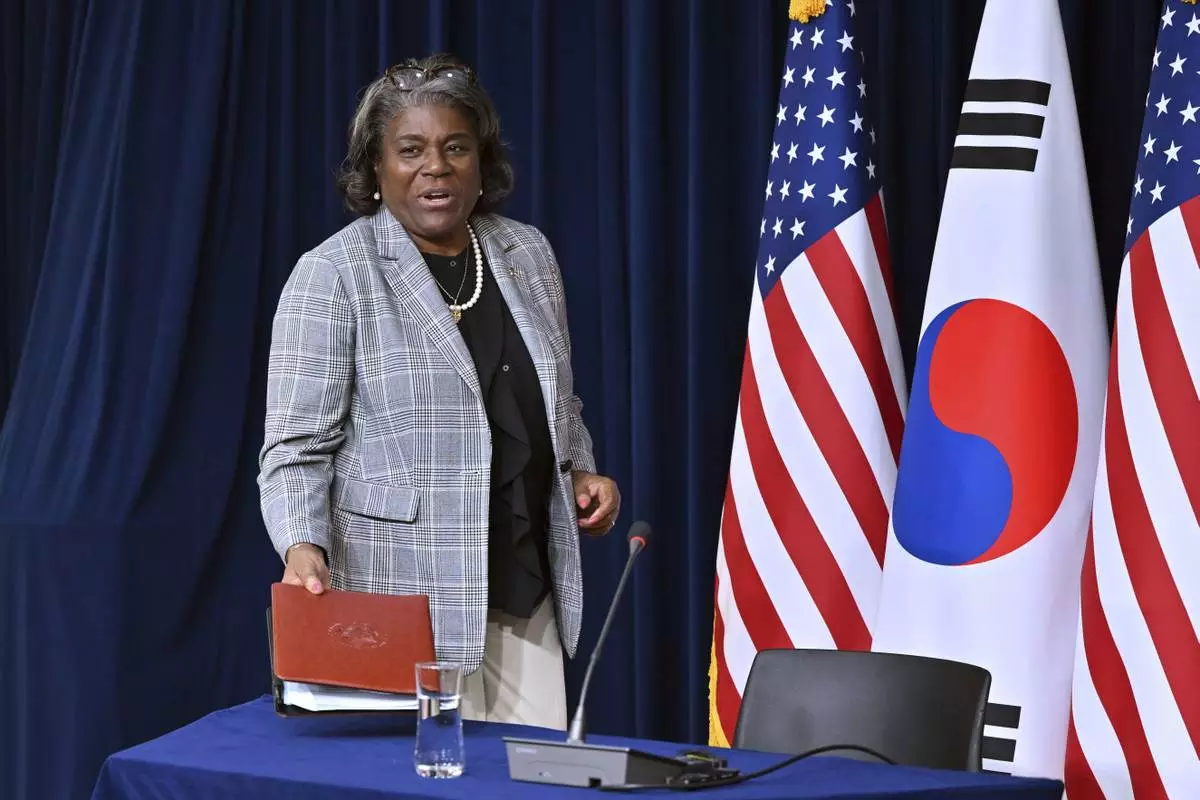
U.S. Ambassador to the United Nations Linda Thomas-Greenfield arrives to attend a press conference at the American Diplomacy House in Seoul Wednesday, April 17, 2024. (Jung Yeon-je/Pool Photo via AP)
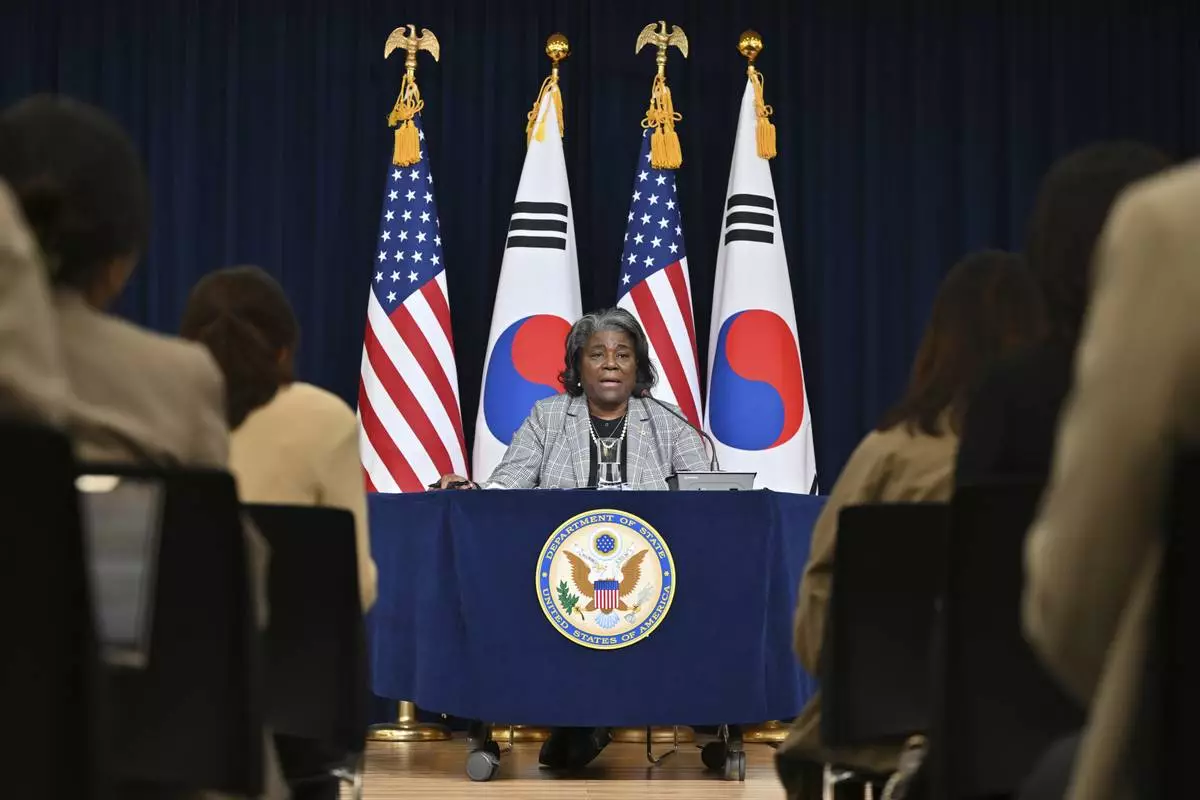
U.S. Ambassador to the United Nations Linda Thomas-Greenfield speaks during a press conference at the American Diplomacy House in Seoul Wednesday, April 17, 2024. (Jung Yeon-je/Pool Photo via AP)
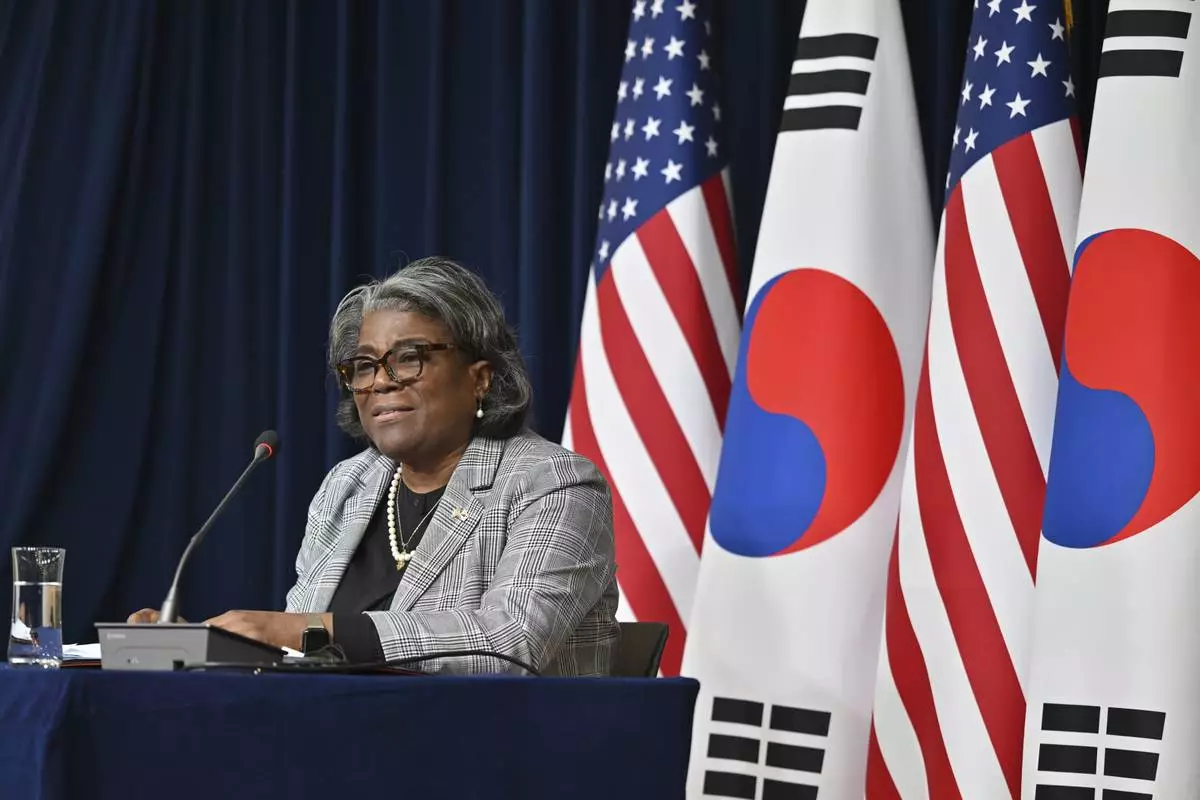
U.S. Ambassador to the United Nations Linda Thomas-Greenfield speaks during a press conference at the American Diplomacy House in Seoul Wednesday, April 17, 2024. (Jung Yeon-je/Pool Photo via AP)
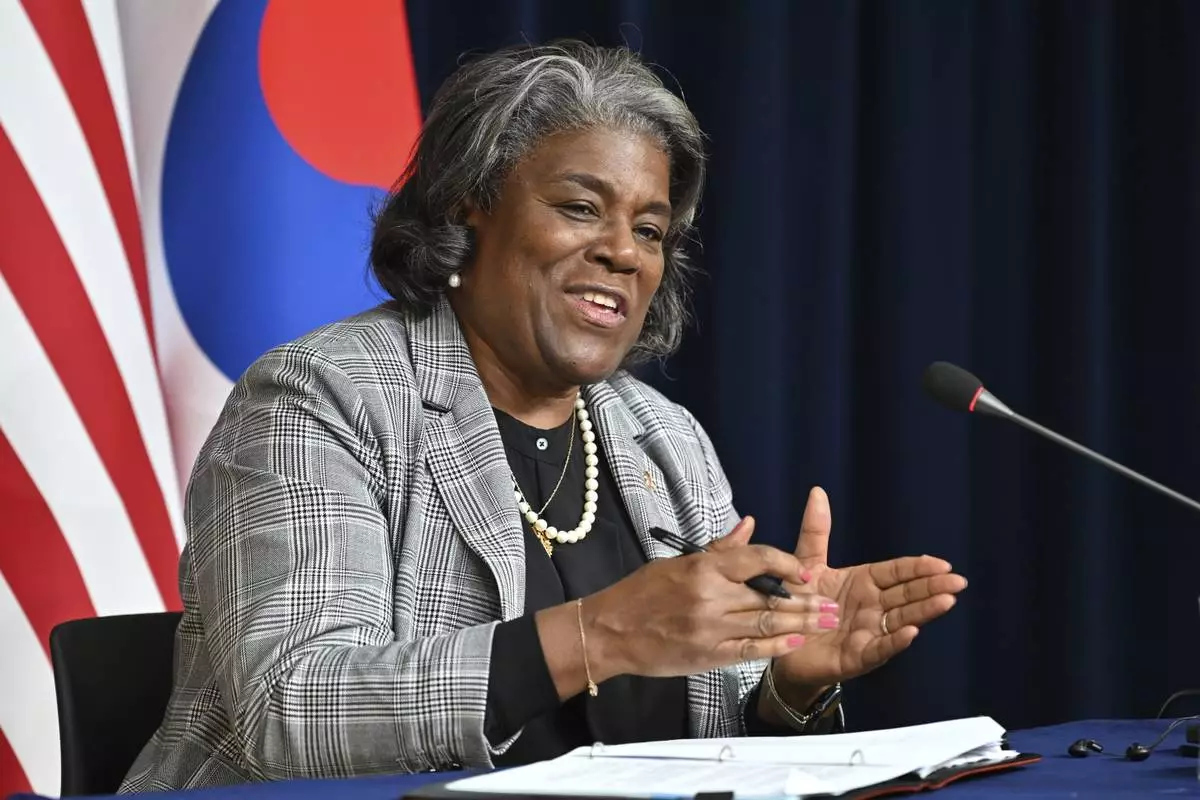
U.S. Ambassador to the United Nations Linda Thomas-Greenfield speaks during a press conference at the American Diplomacy House in Seoul Wednesday, April 17, 2024. (Jung Yeon-je/Pool Photo via AP)
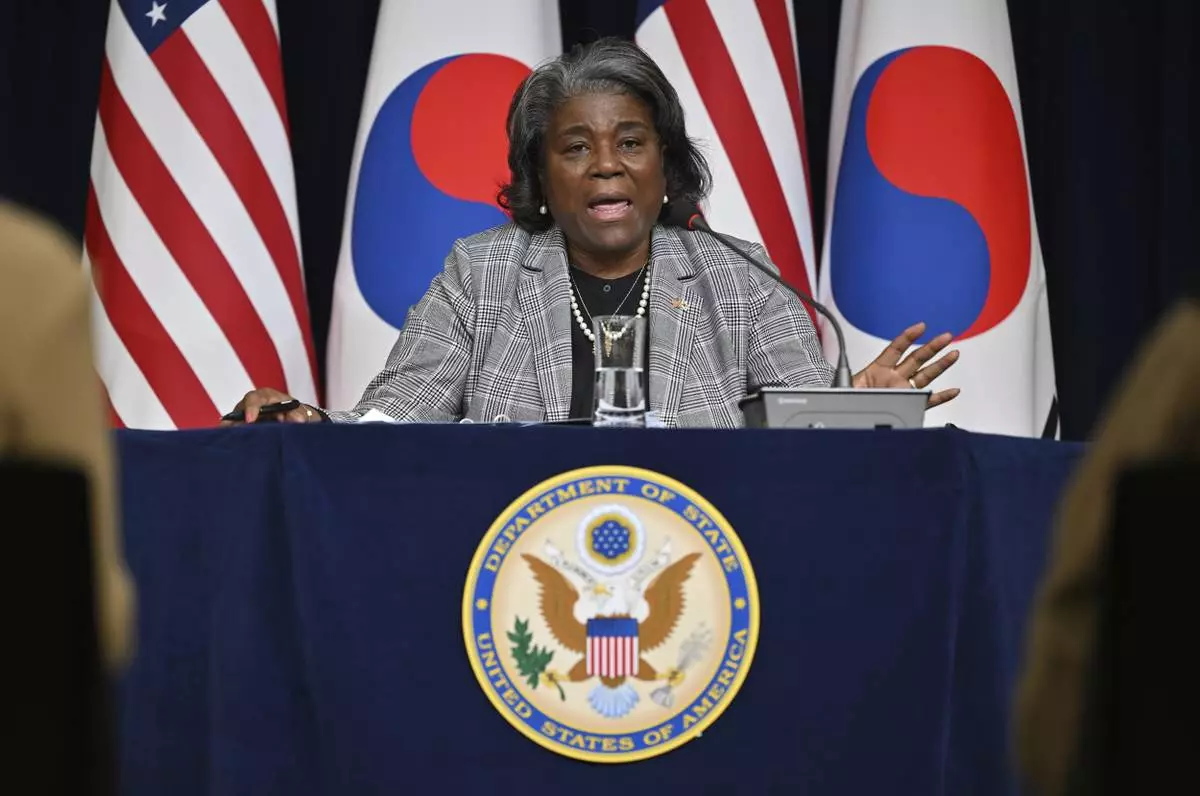
U.S. Ambassador to the United Nations Linda Thomas-Greenfield speaks during a press conference at the American Diplomacy House in Seoul Wednesday, April 17, 2024. (Jung Yeon-je/Pool Photo via AP)
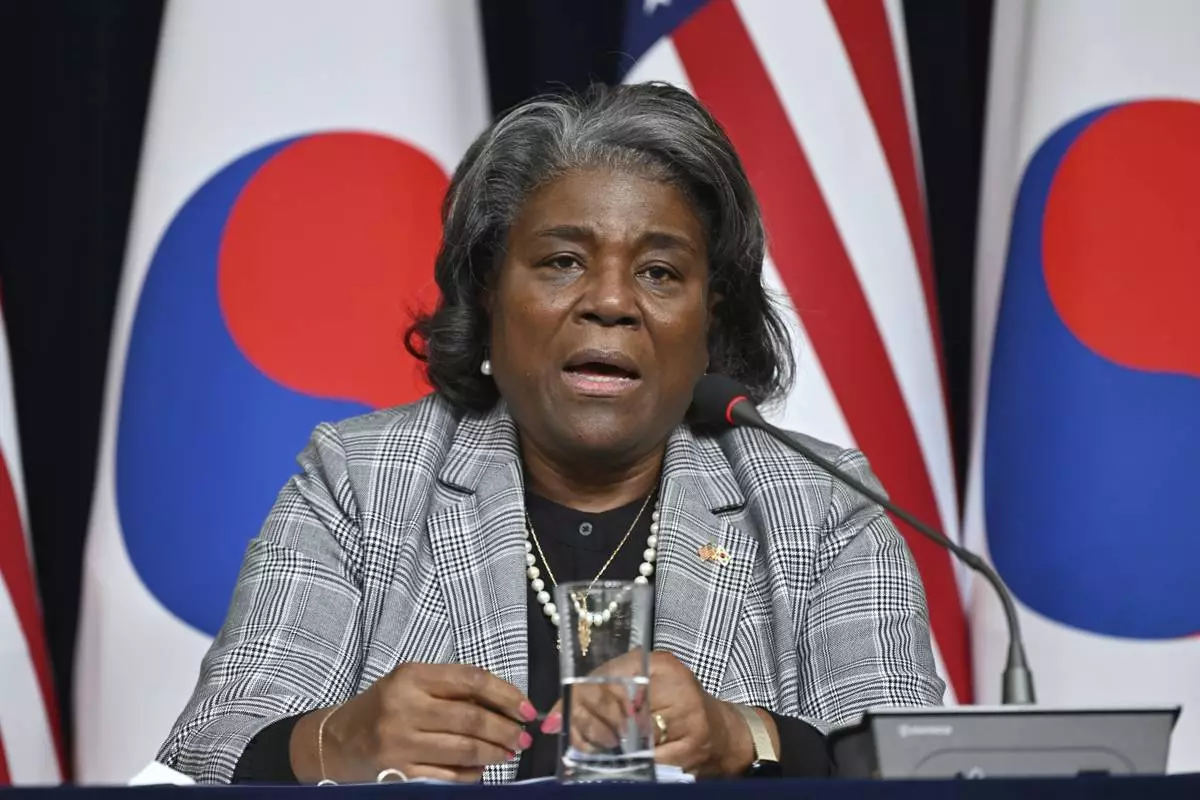
U.S. Ambassador to the United Nations Linda Thomas-Greenfield speaks during a press conference at the American Diplomacy House in Seoul Wednesday, April 17, 2024. (Jung Yeon-je/Pool Photo via AP)


















